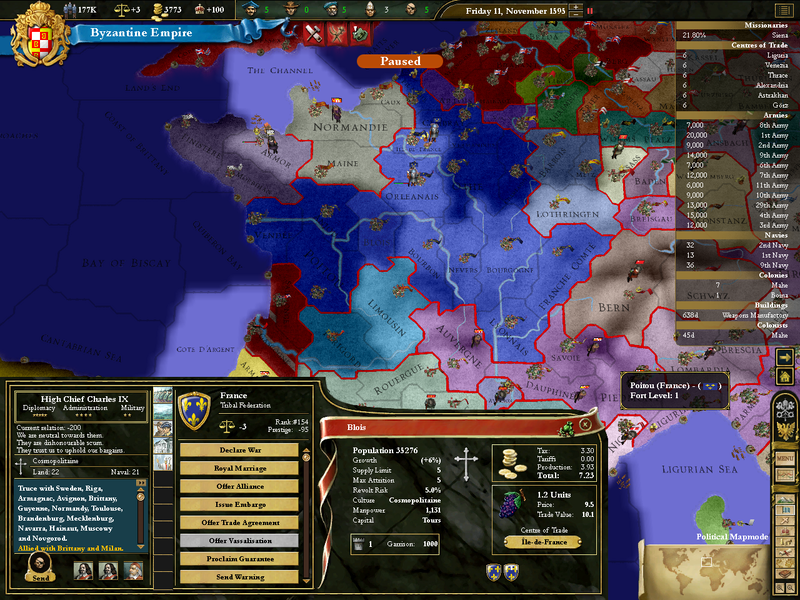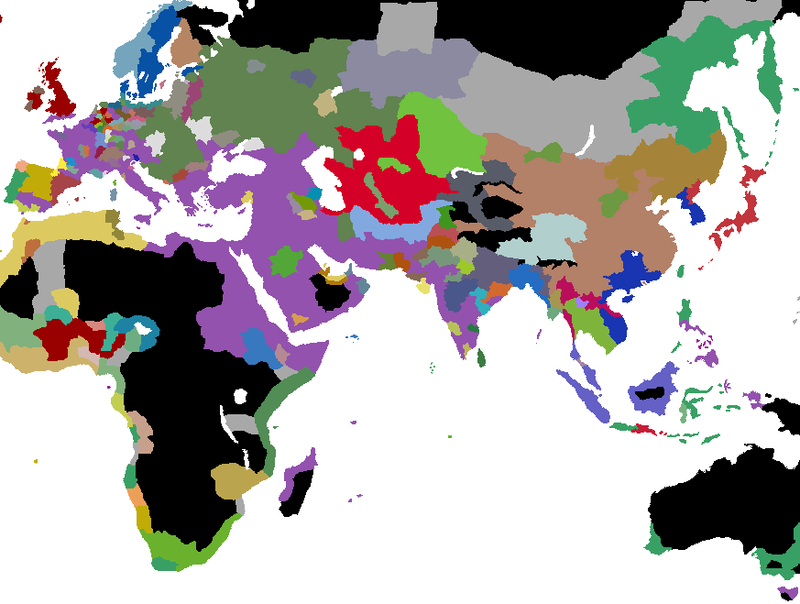I'm proud to present my very first AAR, representing the culmination of all the expansion I have done with my Byzantine Empire as I prepared to take down the Russian goliath with a colossus of my own. This AAR takes place between the years 1719 and 1721, ending with the war itself. Oh, and I'm playing on all the default settings, vanilla IN. I hope you all enjoy the story.
From the brink of defeat, the Roman Empire was resurrected by the Grace of God and banished the infidels from its lands. In time, the Empire reacquired its historical possessions through the blood of countrymen and foreigners. This was a golden age for the Empire, and all of Europe watched in awe as the Emperor reestablished the Empire as the most powerful force in the region, rivaling even the mighty states of France and England.
However, this sincere respect would be replaced by fear and hostility as the Emperors sought to spread the boundaries of the Empire even farther. The cities of Italy fell to Byzantine forces, and even the Pope was chased from his lands and into Germany. None dared face the Byzantines, who had allied with the cunning Austrians in order to secure their dominance over Central and Eastern Europe.
There was, however, a contender...
The Kingdom of Bohemia, which had for a century spread its borders at the expense of Hungary and Poland, maintained a bitter peace and an uneasy rivalry with the Byzantine Empire as both sought to dominate the Balkans. However, the last King of Bohemia died without an heir. News of this event spread throughout Europe and into Muscovy, where the Muscovite Grand Prince--second cousin once removed of the late Bohemian king--was proclaimed the new king of Bohemia, doubling the size of his demesne. He would later declare himself King of the Muscovite Empire.
This led to an era wherein much of Europe--and indeed much of the world--was divided up and dominated by the dual Orthodox empires of Muscovy and Rome. By the dawn of the 18th century, the colonial possessions of Castille had torn apart the shackles of imperialism and declared independence. Brazil, Chile, and Louisiana became lands of freedom from the tyranny of kings, while Europe still bore the burden of imperial repression. In order to escape certain destruction, the Portugese government moved to America, from which they could expand their borders freely into uncharted territories in the Americas and Asia.
The Byzantine Empire, after subduing the kings of India, turned its eyes back towards Europe. The Kingdom of France would soon be reduced to a shadow of its former self as Byzantine soldiers razed the countryside, sowing salt into the fields, confiscating farm equipment, and burning cultural and scientific literature.

Meanwhile, the peoples of New France in North America broke apart from their illiterate overlords and began a new life of communal living and democracy, forming the United States of America.
Many times had the electors of the Holy Roman Empire, bitter towards the iron grip with which the Byzantine Empire held Europe, elected the King of Muscovy as Emperor. Ivan VI was the last King of Muscovy and first Tsar of Russia. Meanwhile, In the Byzantine Empire, a regency council had ruled since the death of the last Emperor until his heir, Andronikos XI, was fit to take his seat upon the throne. The nobles of the council fostered in the young heir a deep resentment of the Russian Tsar. Upon Andronikos XI's 17th birthday, he was granted the title of Absolute Emperor of Rome. By this time, Ivan VI of Russia had died of an intestinal worm and been replaced by his prodigious son, Pyotr I.
One day, years later, Andronikos fumed upon his throne and then summoned his court. In the midnight hours in Constantinople, they devised a plan that would ultimately result in hundreds of thousands of deaths, all in order to shift the balance of power between the two mightiest empires the world had ever seen. Like two caged creatures who had grown too large for their habitat, they would be forced to turn on one another if they wished to grow further.
Next:
Chapter 1: Goliath vs. Goliath; Andronikos's Gambit
Fools of Damnation:
The Orthodoxy War
The Orthodoxy War
PROLOGUE
1399 AD - 1719 AD
From the brink of defeat, the Roman Empire was resurrected by the Grace of God and banished the infidels from its lands. In time, the Empire reacquired its historical possessions through the blood of countrymen and foreigners. This was a golden age for the Empire, and all of Europe watched in awe as the Emperor reestablished the Empire as the most powerful force in the region, rivaling even the mighty states of France and England.
However, this sincere respect would be replaced by fear and hostility as the Emperors sought to spread the boundaries of the Empire even farther. The cities of Italy fell to Byzantine forces, and even the Pope was chased from his lands and into Germany. None dared face the Byzantines, who had allied with the cunning Austrians in order to secure their dominance over Central and Eastern Europe.
There was, however, a contender...
The Kingdom of Bohemia, which had for a century spread its borders at the expense of Hungary and Poland, maintained a bitter peace and an uneasy rivalry with the Byzantine Empire as both sought to dominate the Balkans. However, the last King of Bohemia died without an heir. News of this event spread throughout Europe and into Muscovy, where the Muscovite Grand Prince--second cousin once removed of the late Bohemian king--was proclaimed the new king of Bohemia, doubling the size of his demesne. He would later declare himself King of the Muscovite Empire.
This led to an era wherein much of Europe--and indeed much of the world--was divided up and dominated by the dual Orthodox empires of Muscovy and Rome. By the dawn of the 18th century, the colonial possessions of Castille had torn apart the shackles of imperialism and declared independence. Brazil, Chile, and Louisiana became lands of freedom from the tyranny of kings, while Europe still bore the burden of imperial repression. In order to escape certain destruction, the Portugese government moved to America, from which they could expand their borders freely into uncharted territories in the Americas and Asia.
The Byzantine Empire, after subduing the kings of India, turned its eyes back towards Europe. The Kingdom of France would soon be reduced to a shadow of its former self as Byzantine soldiers razed the countryside, sowing salt into the fields, confiscating farm equipment, and burning cultural and scientific literature.

Meanwhile, the peoples of New France in North America broke apart from their illiterate overlords and began a new life of communal living and democracy, forming the United States of America.
Many times had the electors of the Holy Roman Empire, bitter towards the iron grip with which the Byzantine Empire held Europe, elected the King of Muscovy as Emperor. Ivan VI was the last King of Muscovy and first Tsar of Russia. Meanwhile, In the Byzantine Empire, a regency council had ruled since the death of the last Emperor until his heir, Andronikos XI, was fit to take his seat upon the throne. The nobles of the council fostered in the young heir a deep resentment of the Russian Tsar. Upon Andronikos XI's 17th birthday, he was granted the title of Absolute Emperor of Rome. By this time, Ivan VI of Russia had died of an intestinal worm and been replaced by his prodigious son, Pyotr I.
One day, years later, Andronikos fumed upon his throne and then summoned his court. In the midnight hours in Constantinople, they devised a plan that would ultimately result in hundreds of thousands of deaths, all in order to shift the balance of power between the two mightiest empires the world had ever seen. Like two caged creatures who had grown too large for their habitat, they would be forced to turn on one another if they wished to grow further.
Next:
Chapter 1: Goliath vs. Goliath; Andronikos's Gambit









